Podcast
Questions and Answers
What is the primary purpose of long-term nuclear storage facilities?
What is the primary purpose of long-term nuclear storage facilities?
- To isolate nuclear waste from humans and the environment (correct)
- To generate more nuclear energy
- To store nuclear waste in above-ground containers
- To cool nuclear waste quickly
What is a crucial consideration when selecting a site for a long-term nuclear storage facility?
What is a crucial consideration when selecting a site for a long-term nuclear storage facility?
- Accessibility for regular maintenance
- Proximity to populated areas
- Geological stability and lack of flooding risk (correct)
- Availability of above-ground storage containers
What is the current status of the Yucca Mountain Nuclear Waste Repository?
What is the current status of the Yucca Mountain Nuclear Waste Repository?
- Its implementation has been delayed due to public and political debates (correct)
- It is under construction and expected to open soon
- It has been abandoned as a potential repository site
- It is fully operational and storing nuclear waste
Why is the Yucca Mountain location considered suitable for long-term nuclear waste storage?
Why is the Yucca Mountain location considered suitable for long-term nuclear waste storage?
What is the current situation regarding permanent repositories for spent fuel in the United States?
What is the current situation regarding permanent repositories for spent fuel in the United States?
What is the primary advantage of nuclear power as a climate-friendly energy source?
What is the primary advantage of nuclear power as a climate-friendly energy source?
What is the main safety concern associated with nuclear power plants?
What is the main safety concern associated with nuclear power plants?
What is the process that occurs when uranium nuclei are bombarded with neutrons?
What is the process that occurs when uranium nuclei are bombarded with neutrons?
What is the purpose of controlling the uranium chain reaction in a nuclear power plant?
What is the purpose of controlling the uranium chain reaction in a nuclear power plant?
What is the significance of the isotope U-235 in nuclear power plants?
What is the significance of the isotope U-235 in nuclear power plants?
What is the primary purpose of control rods in a nuclear reactor?
What is the primary purpose of control rods in a nuclear reactor?
What is the main health concern associated with nuclear power accidents?
What is the main health concern associated with nuclear power accidents?
What is a common method of cooling nuclear reactors?
What is a common method of cooling nuclear reactors?
What is a challenge posed by radioactive waste?
What is a challenge posed by radioactive waste?
What is the purpose of the containment walls surrounding a nuclear reactor?
What is the purpose of the containment walls surrounding a nuclear reactor?
Flashcards are hidden until you start studying
Study Notes
Nuclear Power Basics
- Nuclear power is a climate-friendly energy source, generating power without releasing carbon dioxide, a greenhouse gas.
- Nuclear power plants work on the concept of nuclear fission, where uranium nuclei are bombarded with neutrons, releasing heat, radiation, and more neutrons.
Safety Concerns
- Nuclear power plants can accidentally release radiation into the environment or be targeted for a terrorist attack.
- In a nuclear reactor, the uranium chain reaction is controlled, preventing an explosion like an atomic bomb.
- A meltdown can occur if the cooling system fails, resulting in the melting of the reactor's core and potential radiation release.
Health Concerns
- Exposure to radiation can have negative effects on the human body, potentially causing cancer or radiation sickness.
- Radiation sickness symptoms include skin burns, nausea, vomiting, diarrhea, hair loss, general weakness, and possibly death.
Environmental Concerns
- Nuclear power plants use local water sources for cooling, which can disrupt aquatic life and release pollutants into the waterway.
Terrorism and Security Concerns
- Containment walls surrounding nuclear reactors are designed to withstand hurricanes, tornadoes, earthquakes, and small plane crashes.
- Terrorist attacks on nuclear reactors are a concern, but the impact of such an attack is unpredictable.
Radioactive Waste Disposal
- Radioactive waste from nuclear fission cannot be disposed of by conventional means due to its long-lasting radioactivity.
- Current storage methods involve cooling and storing spent fuel rods on-site, with long-term storage facilities being researched.
- Potential repository sites like Yucca Mountain Nuclear Waste Repository are being evaluated for permanent storage of nuclear waste.
Studying That Suits You
Use AI to generate personalized quizzes and flashcards to suit your learning preferences.



